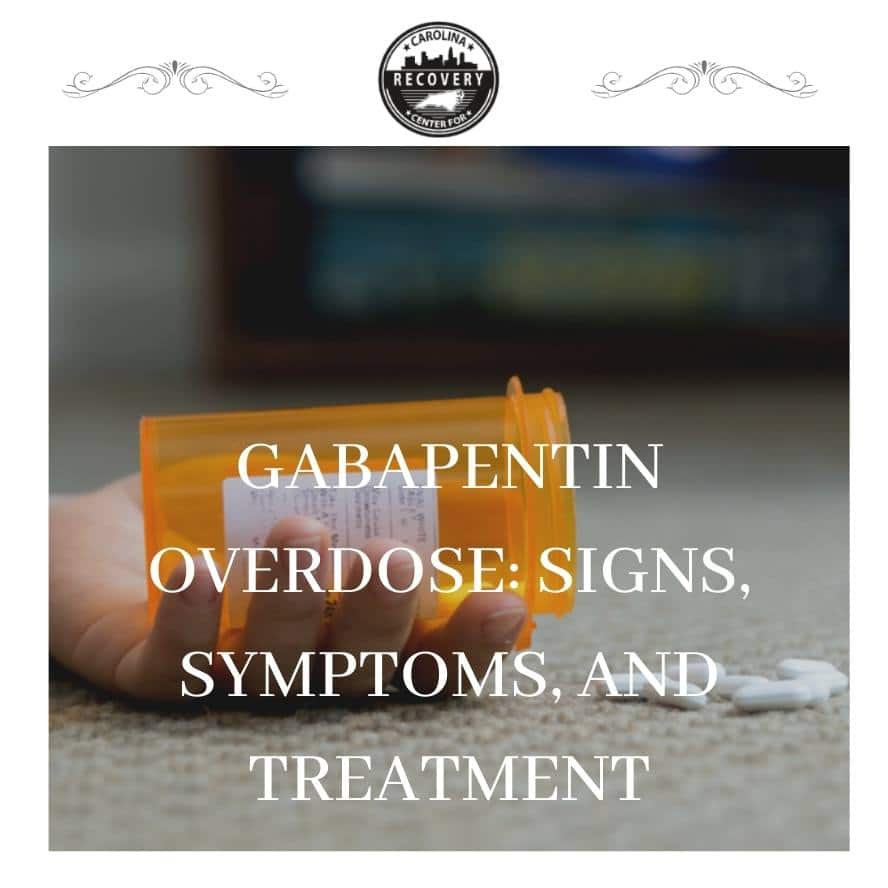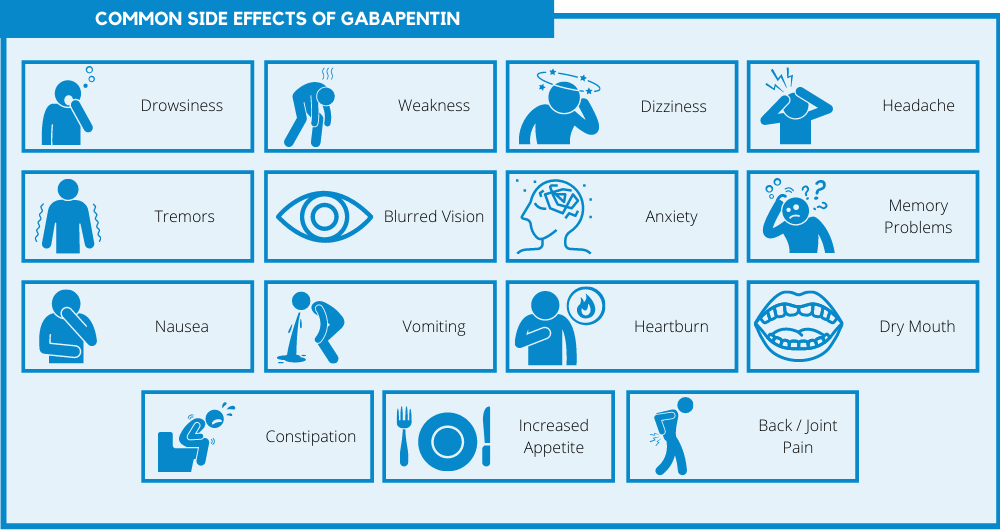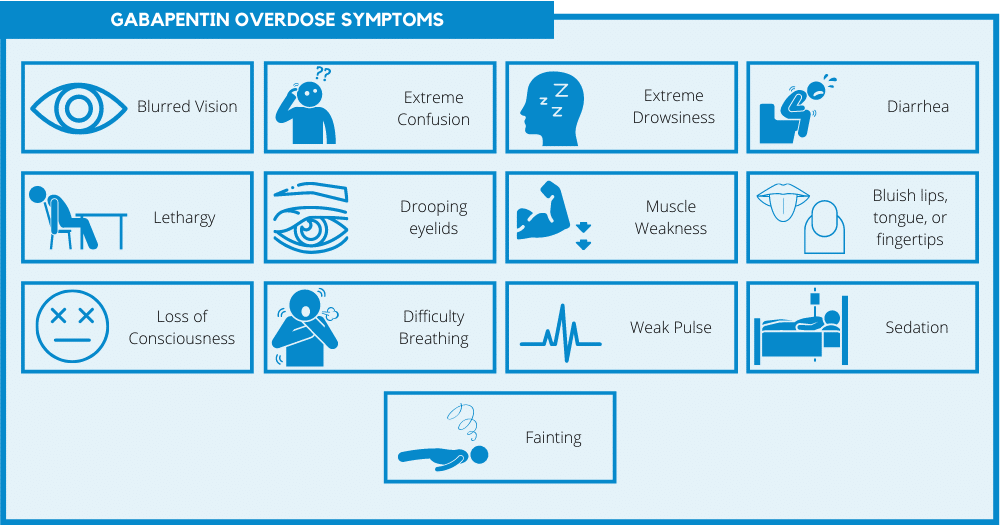Gabapentin Overdose: Signs, Symptoms, and Treatment

Medically Verified: 2/1/24
Medical Reviewer
Chief Editor

All of the information on this page has been reviewed and verified by a certified addiction professional.
Taking too much of a drug like gabapentin can result in a potentially fatal overdose. And, by the time a person realizes he or she is experiencing a gabapentin overdose, it may be too late to call for help and receive treatment in time.
The best way to avoid an overdose is to get sober and avoid abusing drugs and alcohol altogether. Here is everything you need to know about gabapentin toxicity and treatment.
What is Gabapentin (Neurontin)?
Gabapentin is a muscle relaxer and an anticonvulsant that is used to help control partial seizures in people struggling with epilepsy. It may also be used to manage certain chronic nerve pain conditions, such as postherpetic neuralgia – a pain condition that can develop after shingles.[1]
While gabapentin is generally not used to treat minor injuries or arthritis, it may be used to control certain pain conditions that are related to the central nervous system. This medication is available in the form of an instant-release capsule, an extended-release tablet, or an oral solution.
Gabapentin Side Effects
Like any other medication, gabapentin may cause side effects ranging from mild to severe. People who abuse gabapentin by taking the drug in higher amounts than directed may be more likely to experience severe side effects.
Common side effects of gabapentin include:[1]

- Drowsiness
- Weakness
- Dizziness/unsteadiness
- Headache
- Uncontrollable shaking
- Blurred or double vision
- Anxiety
- Memory problems
- Nausea or vomiting
- Heartburn
- Dry mouth
- Constipation
- Increased appetite
- Back or joint pain
Other side effects that may be more serious include:

- Red or itchy eyes
- Rash
- Swelling of the face, tongue, lips, eyes, or throat
- Difficulty breathing or swallowing
- Seizures
- Confusion
- Extreme sleepiness
Gabapentin Abuse
In recent years as the opioid epidemic exploded in the United States, gabapentin abuse skyrocketed as well. This drug is commonly abused by people who are seeking a calmer, more mellow high than the high that is brought on by opioids.
Other people will combine gabapentin with benzodiazepines, opioids, or alcohol to enhance the effects of both substances. Of course, mixing gabapentin with other drugs or taking too high of a dose is extremely dangerous.
People who abuse and become dependent on gabapentin may experience withdrawal symptoms when they attempt to stop using the drug. As a result, once addicted, it can be very difficult to quit.
Furthermore, people who abuse gabapentin are far more likely to overdose on the drug. And, those who use gabapentin by snorting or injecting may also be at an increased risk of overdose.
Gabapentin Overdose Symptoms
It isn’t as easy to overdose on gabapentin as it is to overdose on more potent drugs like heroin, fentanyl, or oxycodone. However, an overdose is possible if someone takes far too many pills or combines the drug with another intoxicating substance.[2]
Symptoms of gabapentin overdose include:[1]

- Double or blurred vision
- Extreme confusion
- Extreme drowsiness
- Diarrhea
- Lethargy
- Drooping eyelids
- Muscle weakness
- Bluish lips, tongue, or fingertips
- Sudden collapse/fainting
- Difficulty breathing
- Weak pulse
- Sedation
- Loss of consciousness
Anyone who shows signs of an overdose or allergic reaction to gabapentin should contact emergency medical services immediately. Left untreated, these symptoms can turn fatal.
Treatment for Gabapentin Overdose
Once medical services arrive, they can begin treating the symptoms of a gabapentin overdose. If the person has combined gabapentin with opioids, the person may be given naloxone to help reverse the overdose. If no opioids are suspected, other treatment will happen.
Standard overdose treatment can include any or all of the following:
- Helping the person maintain an open airway, administering supplemental oxygen, and providing ventilation assistance if needed.
- Administering activated charcoal or gastric lavage to forcibly remove any remaining gabapentin in the body.
- Providing support and treatment for coma or stupor.
- Providing management and treatment of symptoms like delirium, agitation, confusion, or aggression.
- Protecting the patient from self-injury or further bodily harm.
The good news is, if treatment is obtained in time, most overdoses on gabapentin can be treated and reversed without any significant or long-term complications.
Find Help Today
While the risk of overdosing on gabapentin may be lower than that of other, stronger drugs, that doesn’t mean it can’t happen. Gabapentin is known to increase the risk of opioid and alcohol-related deaths – and gabapentin abuse can lead to addiction.
If you or someone you know is abusing gabapentin, it’s time to reconsider your actions and think about getting help. Contact Carolina Center for Recovery today to learn about your addiction treatment options.
References:

